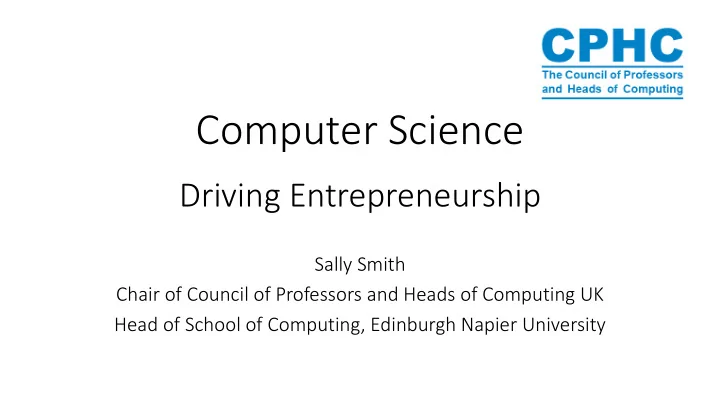

Computer Science Driving Entrepreneurship Sally Smith Chair of Council of Professors and Heads of Computing UK Head of School of Computing, Edinburgh Napier University
Introduction • CPHC – 700 members in the UK, from over 100 universities • April 2014 published a report into the role of university computing departments in promoting and supporting entrepreneurship
Motivation – improve perceptions of CS discipline To counter recent negative public discourse, such as • Big public sector IT projects fail • Employers don’t get the graduates they need • Couldn’t vendor MOOCs replace CS degrees? • Unemployment rates of CS grads higher than other subjects
Graduate unemployment • Destinations of Leavers in Higher Education – published Summer 2014 – for summer 2013 graduates • Overall graduate unemployment rate 7.6% • Computer science graduate unemployment rate 13%
Not the only story…..employment • Graduate employment rate in Maths 46.9% • Graduate employment rate in CS is much higher at 67% • The figure quoted includes employed AND in further study • ONLY 10% of CS graduates go on to further study
Still not the only story… • CS graduate unemployment rates after 3.5 years (the follow up data collection point) is 5.8% • which is the same figure as Engineering&Technology • while medicine and dentistry is 5.5% Source https://www.hesa.ac.uk/index.php?option=com_pubs&Itemid=&task=show_year&pubId=1714&versionId=54&yearId=292
And other good news…. • Headlines in newspapers in the UK citing CS graduates as the highest paid - http://dailymail.co.uk/news/artic le-2781180/And-geeks-shall- inherit-best-pay-Figures-reveal- computer-science-graduates- earn-best-wages-leaving- university.html
The process • Enterprise and Entrepreneurship in Computing Curricula resources (2013 workshop) as starting point • Survey – of all CS departments • Desk-based research into entrepreneurship as surfacing from websites/ external promotional material
The findings… • A diverse range of models found • Student-led • Staff-led • Resources included incubator labs • Embedded in curriculum • …or not
Case study 1: Student IT consultants • University of Kent • Kent IT Consultancy • Support from industry • Gives students practical experience • Serves the needs of local business – SMEs in particular
Case Study 2: Technology spin-outs • Queen’s University • Analytics Engines • Support from venture capitalist • Grant for secondment - CTO • Also placement on courses
The report http://cphcuk.files.wordpress.com/201 4/04/cphc-computer-science-driving- entrepreneurship-final.pdf
Data – the difficulty with it • The dearth of public data on entrepreneurship and computer science, relating to course uptake and graduate destinations. • Collated data on computer science start-ups and spin- offs, whether led by staff or students, is not available. • UCAS course search only uses the course title, not the course summary or any of the deeper information on modules.
Impact - REF • Later this year the Research Excellent Framework is published • More good news stories will emerge
Conclusion • CPHC is promoting the computer science discipline • Improving the nature of the discourse • Recognising the value of entrepreneurship is one way of doing this
Thank you!
Recommend
More recommend